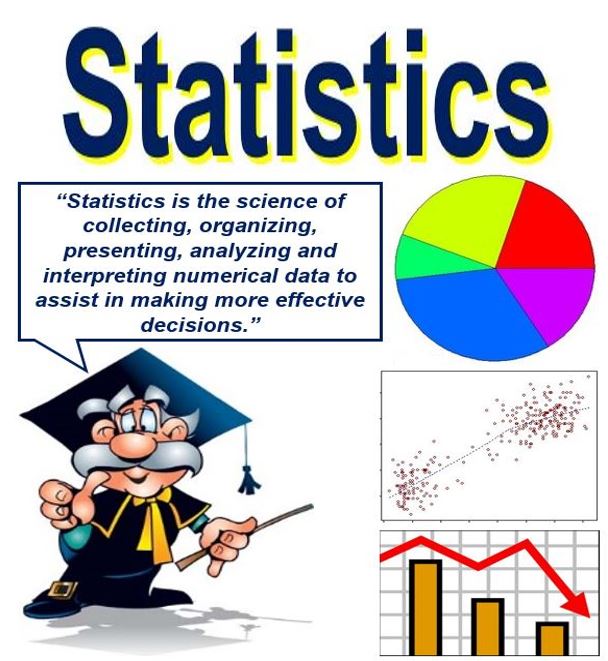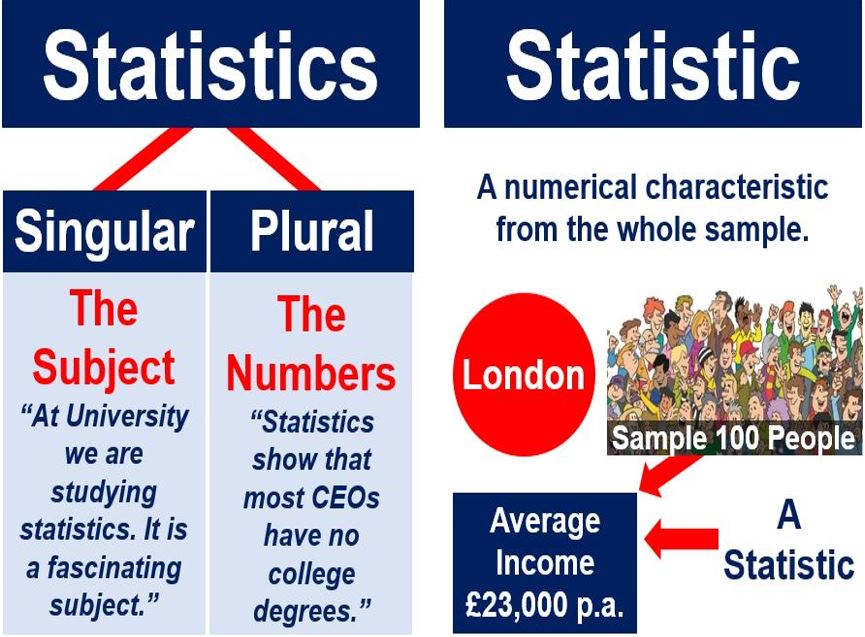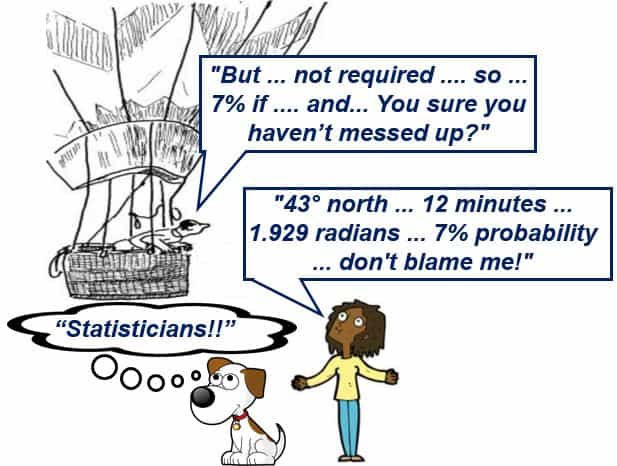Statistics is the science of gathering and analyzing numerical data in large quantities. It is the science of learning from data, and measuring, controlling and communicating uncertainty, especially for the purpose of inferring proportions in a whole from those in a representative sample.
Statistics can be either a singular or plural word. In the singular form, it refers to the science of gathering, presenting, analyzing and interpreting numerical data. The plural word ‘statistics’ refers to facts presented in numerical form, or observations collected with a definite purpose.
Singluar: When talking about the subject you use the singular. For example: “Tomorrow I have statistics in the morning and economics in the afternoon. Statistics is interesting, but I sometimes struggle with numbers.”

Plural: When talking about the numbers, then it is a plural word. For example: “The relationship between overweight and disease remain controversial, although statistics clearly associate (not ‘associates’) a reduced life-span with long-term obesity.”
Put simply, when the word refers to the subject it is singular, but when you are talking about the numbers it is plural.
What is a statistic?
A statistic is a piece of data, a fact, obtained from a study of a large quantity of numerical data, i.e. the single measure of some attribute of a sample.
A statistic is a feature (characteristic) of a sample. Generally it is used to estimate the value of a population parameter.

For example, imagine we had selected a random sample of 100 citizens in a small town with 10,000 residents. The average height of the sampled citizens would be an example of a statistic, as would their average income or the average number of credit cards each one had.
Any measurable feature of a sample would be an example of a statistic.
Statisticians
People who specialize in statistics are called statisticians. They apply statistical thinking and methods to a vast range of social, scientific and business endeavors in such areas as economics, marketing, education, biology, genetics, engineering, psychology, public health, medicine, and many more.
Leaders of countries, lawmakers and military generals cannot make decisions or get approval for their proposals without the help of statisticians.
A pharmaceutical company needs to present piles of statistical data to the regulatory authorities, such as the FDA in the US or the EMA in the EU, if it wants to get its new drug approved.
Dictionary.com defines statistics in the following way:
“(used with a singular verb) the science that deals with the collection, classification, analysis, and interpretation of numerical facts or data, and that, by use of mathematical theories of probability, imposes order and regularity on aggregates of more or less disparate elements.”
“(used with a plural verb) the numerical facts or data themselves.”
When a statistician says that something is statistically significant, it means that the finding is 95% reliable – it does not mean the result is important.
Etymology of ‘statistics’
The word ‘statistics’ ultimately originates from the New Latin statisticum collegium (council of state) and statista (Italian for statesman or politician).
German philosopher, historian, economist, jurist and statistician Gottfried Achenwall (1719-1772) first introduced the word Statistik in the German language in 1749 – it was originally designated the analysis of data about the state, meaning the ‘science of state’ (in English at the time: political arithmetic).
The word first entered the English language in 1791, when Scottish politician and writer on finance and agriculture Sir John Sinclair of Ulbster, 1st Baronet (1754-1835) used the term with its modern meaning in the first of 21 volumes titled Statistical Account of Scotland.
Quotes: Statistics
– “There are three types of lies — lies, damn lies, and statistics.” (Benjamin Disraeli)
– “A single death is a tragedy; a million deaths is a statistic.” (Joseph Stalin)
– “I thought the divorce statistics would never apply to me. I was beyond heartbroken when they did. But I got up and got on with it. I also kept my belief in marriage.” (Jennifer Garner)
– “Facts are stubborn things, but statistics are pliable.” (Mark Twain)
– “We are not concerned with the very poor. They are unthinkable, and only to be approached by the statistician or the poet.” (E.M. Forster)
– “A certain elementary training in statistical method is becoming as necessary for everyone living in this world of today as reading and writing.” (H.G. Wells)
– “The greatest moments are those when you see the result pop up in a graph or in your statistics analysis – that moment you realise you know something no one else does and you get the pleasure of thinking about how to tell them.” (Emily Oster)
– “It is the mark of a truly intelligent person to be moved by statistics.” (George Bernard Shaw)
– Smoking is one of the leading causes of all statistics. (Liza Minnelli)
Statistician joke
A man who is flying in a hot air balloon has no idea where he is – he is completely lost. So he descends to about fifty feet over a field and shouts to a woman on the ground:
Balloon man: “Can you tell me where I am, and which way I’m headed?”
Woman on ground: “Sure! You’re at 43 degrees, 12 minutes, 21.2 seconds north; 123 degrees, 8 minutes, 12.8 seconds west. You’re at 212 meters above sea level. Right now, you’re hovering, but on your way in here you were at a speed of 1.83 meters per second at 1.929 radians”

Balloon man: “Thanks! By the way, are you a statistician?”
Woman on ground: “I am! But how did you know?”
Balloon man: “Everything you’ve told me is completely accurate; you gave me more detail than I needed, and you told me in such a way that it’s no use to me at all!”
Woman on ground: “Oh dear! By the way, are you a principal investigator?”
Balloon man: “My goodness! How’d you know that?!”
Woman on ground: “You don’t know where you are, you don’t know where you’re going. You got where you are by blowing hot air, you start asking questions after you get into trouble, and you’re in exactly the same spot you were a few minutes ago, but now, and somehow, it’s my fault!
Statistics in other languages: (German) Statistiken, (Spanish) Estadística, (Portuguese) Estatística, (Italian) Statistica, (French) Statistiques, (Russian) Статистика, (Japanese) 統計, (Chinese) 统计, (Arabic) إحصائيات.
Video – What is statistics?
In this video, a computational geneticist explains what statistics is and why it is so important for her work.
